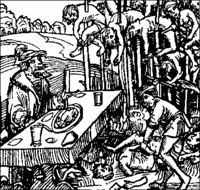(Links thanks to the lovely folks at No Treason.)
 From the paleo-deviationists to the neo-deviationists, let’s now consider the recent fuss over the latest incisive moral theorizing from Humane Studies wunderkind Vlad Dracula:
From the paleo-deviationists to the neo-deviationists, let’s now consider the recent fuss over the latest incisive moral theorizing from Humane Studies wunderkind Vlad Dracula:
If boiling people alive best served the interests of the Wallachian
people, then it would neither be moral or immoral.
Since Vlad has since complained that the infidel are distorting what he said (and playing dirty pool, too!), let’s make sure we have it all in its proper context. Vlad has argued at length in several places that the notion of universal human rights is ultimately nonsensical: rights are, on his account, political artifacts, not natural facts, and so claims of rights only make sense within the context of a constitutional order. He argues, further, that because rights are not natural facts, the citizens of one country have no objectively binding obligations to respect the lives, dignity, or autonomy of people in other countries. He cavils that gratuitous cruelty might not be justified; but that this is merely a matter of a sentimental
, not a normative
should. One of his infidel challengers had the temerity to point out:
His position on the moral significance of foreigners is also
incoherent. If they do not have rights, why should we treat them
with decency? Can’t we just smash their heads in with hammers, or
nuke them, or boil them alive? What is a sentimental should
and where does it come from?
To which Vlad replied:
If boiling people alive best served the interests of the Wallachian
people, then it would neither be moral or immoral. It would just be
grotesque, or indecent, or harsh. But since it doesn’t have any
strategic value, we don’t boil people or nuke them. A
sentimental should
means that most of us find such behavior
unsavory, even barbaric–but it doesn’t match up against any grand
moral standard etched into a Libertarian Rosetta Stone. To
momentarily digress into pop-philosophical obscurantism, it’s
intersubjectively wrong,
not objectively wrong (i.e.
politically circumscribed).

A theory of humane justice.
Prince Dracula is well within his prerogatives to demand some direct approach to addressing this more nuanced perspective
. So let’s see what we can do by way of a logical response to the argument.
If you can’t make significant rights claims independently of a
constitutional order, then there is nothing wrong with boiling
innocent foreigners alive to serve Wallachian interests, as
long as you don’t mind it.
But there is something wrong with boiling innocent foreigners
alive to serve Wallachian interests, even if you don’t mind
it.
Therefore, you can make significant rights claims independently
of a constitutional order. (M.T. 1, 2)
Thus, Prince Dracula is wrong, and Bargainer and Logan are right. Q.E.D.
You might claim that I have dealt with the Impaler’s (subtle! nuanced!) position in far too short a space; you might even go so far as to claim that I have begged the question against him. No, I haven’t. In fact, he has begged the question. Just as there are no non-question-begging arguments for terrorism, there are no non-question-begging arguments for the permissibility of boiling innocent foreigners alive in order to further Wallachian interests. If Vlad’s argument is valid, the most that he has shown is that his premises are, in fact, incompatible with points of human decency far more clear than any murky Hobbesian musing about the contextuality of rights claims or an alleged state of nature
–and having shown that the Hobbesian argument is incompatible with such a plainly obvious point of human decency is as good a reason as any to deny at least one of the Hobbesian premises. It’s certainly not any reason whatever to dismiss human decency. (For more on the nature of proof and the issue of question-begging, see footnote 2 on my argument against Honderich.)
That it is wrong to boil innocent foreigners alive, and that it is wrong because you are doing something wrong to them is blindingly obvious. In fact, it’s so blindingly obvious that even Dracul admits that it is true; his problem is that he cannot live up to his own moral decency intellectually, and so he invents the weasel category of a sentimental should
in order to sidestep the dilemma. (It’s worth pausing to note that this is exactly the same move that is made by some who claim that we have no direct moral obligations towards animals–in order to weasel around the fact that they know perfectly well that it’s wrong to inflict gratuitous cruelty on animals. That Vlad’s argument uses the same tactic towards human beings from outside of your own state is telling. And not in a good way.)
The problem here is trying to make sense of the notion of a sentimental should
—why is it that we feel horror at contemplating pitching innocent foreigners into the cauldron and boiling them alive? It seems that the sentiment of horror is either a rational or an irrational reaction to the situation. If it’s an irrational response to the situation, then clearly there are no grounds at all to pay the sentiment any heed in making decisions about what we ought or ought not to do; an irrational feeling as such cannot weigh against a course of action. If it’s a rational response to the situation, on the other hand, what would it be that makes it an apt response to the situation? That the deed being done is in fact a ghastly thing to do to another human being no matter what his or her nationality? But Vlad cannot take this stance and still hold onto his Hobbesian argument.
Is the feeling of gut-wrenching horror justified by something else? If so, what? Rule-utilitarians might claim that it’s justified by the fact that cultivating feelings of horror at such human suffering is conducive to respecting the rights of those who Vlad would allow to have legitimate rights-claims (fellow citizens and parties to relevant treaties). But that would make the feeling of horror at boiling foreigners alive into nothing more than a projective error–useful, perhaps, for people who can’t compartmentalize their feelings for foreigners from their feelings for fellow citizens; but the emotional constitution that would be most reflective of the actual state of affairs would be one that sharply distinguishes between the real obligations not to torture fellow citizens and the free-for-all that is (according to Vlad’s argument) permitted against aliens.
Or you might, instead, claim that, because we’re talking about sentimental attachments here, questions of justification by some state of affairs outside of the sentiment don’t even make sense–it’s just part of being a human being that a horror at torturing other human beings is part of your emotional frame. But this won’t do, either: the sentimental should
that Vlad wants to invoke is supposed to be something that enters into our reasons for action; that is, it is something that forms a part of why we do or do not act in a particular way. Emotions are not bludgeons that blindly knock us in one direction or another; they express reasons for or against actions, and as such have to stand or fall as reasons for action, justified or unjustified by how accurately they express the real fact of the matter.
The fact of the matter is that when you throw someone into the cauldron and fill it with boiling water while they scream in agony until they die, you have done something wrong–even if they are not subject to the same state as you are, and even if the state you are subject to is in a state of war with the state that they are subject to. You have done something wrong because you did something wrong to the poor fellow you just boiled alive. If Vlad thinks he has an argument against that, let him bring it out–but he shouldn’t be surprised when it receives nothing more than a certain gesture of the hands.
Update 2004-12-05: Sorry, I got things mixed up a bit. Turns out this was actually about Max Borders writing about the interests of the American people, not about Vlad the Impaler and the Wallachian people. My bad.










 From
From 
